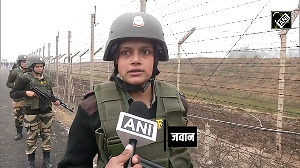Seeking to allay fears of the trading community, the Empowered Committee on Value Added Tax on Thursday said there would no 'inspection raj' when the new state-level tax regime comes into effect from April 2005.
Asim Dasgupta, chairman of the VAT committee, also proposed a parallel committee with representatives from traders and industry bodies that can regularly meet with it and sort out problems that may arise in future.
Interacting with trade bodies from all over the country, Dasgupta said: "The existing sales tax structure was leading to the problem of double taxation and VAT would reduce the cascading effect of taxes and reduce the overall costs."
"Traders on a majority will like to comply if the tax burden is lower," he said at the conference orgainsed by Confederation of All India Traders here.
Sensing the fears of traders on the new regime, Dasgupta said: "We will move from an inspector raj to a system of self-assessment. There will be a transparent auditing. A big dealer would be audited once in five years, while it could be once in 10 years for small dealers."
"There will be no harassment of traders from tax officials and a prior notice would be served before auditing is done," he said, adding that there would be no annual assessment under VAT as it is presently mandated for sales tax.
Dasgupta said traders with a turnover up to Rs 5 lakh (Rs 500,000) would not come under the VAT net, while traders with sales of Rs 5-40 lakh would have to pay 1.0 per cent flat rate.
Traders with a turnover exceeding 40 lakh (Rs 4 million) would come under VAT net.
VAT is proposed at 4.0 per cent for 250 essential items and 12.5 per cent on 217 other items.
About 41 items like petrol, diesel, ATF, agriculture equipment and newspapers would be exempt from VAT, while precious metals like gold and silver would attract only 1.0 per cent tax.
Sugar, textile and tobacco items would also out of the VAT net, Dasgupta said.
Elaborating on the roadmap for VAT implementation, he said Central Sales Tax would be phased out gradually and the Centre has promised to compensate states for revenue losses, if any, during the initial years.
He said there was a broad consensus among states to implement VAT from next fiscal.
The state finance ministers had met on June 18 to discuss the roadmap on VAT. Union Finance Minister P Chidambaram promised them that Centre would offer a compensation package for loss in revenue, if any, when states move on to VAT.






 © 2025 Rediff.com -
© 2025 Rediff.com -